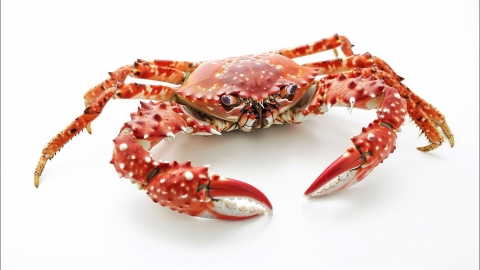What Are the 5 Foods You Should Never Eat After Consuming Persimmons?
Generally speaking, it is not recommended to consume crabs, milk, sweet potatoes, spinach, or alcohol after eating persimmons, as this may cause discomfort. Detailed explanations are as follows:
1. Crabs
Persimmons contain tannic acid, while crabs are high-protein seafood. When consumed together, the tannic acid may bind with the high-quality protein from the crab, forming tannic acid-protein complexes that are difficult to digest. These complexes may irritate the gastrointestinal mucosa, causing symptoms such as abdominal distension, pain, nausea, and discomfort, especially in individuals with weak gastrointestinal function.

2. Milk
Milk is rich in casein. In the acidic environment of the stomach, tannic acid in persimmons can bind with casein to form coagulated masses. This not only affects protein absorption but may also block the gastrointestinal tract, causing indigestion. In severe cases, it could lead to the formation of gastric phytobezoars (persimmon stones).
3. Sweet Potatoes
Sweet potatoes contain large amounts of starch, which can stimulate gastric acid secretion after consumption. In an acidic gastric environment, tannic acid in persimmons may interact with starch and gastric acid to form hard persimmon stones in the stomach. These stones may compress the stomach wall, causing symptoms such as stomach pain, belching, and even gastric mucosal damage or ulcers. The risk significantly increases if persimmons are consumed after eating sweet potatoes on an empty stomach.
4. Spinach
Spinach is rich in calcium. Tannic acid in persimmons may bind with calcium to form insoluble calcium tannate, which not only affects calcium absorption but may also deposit in the intestines. Long-term and large-scale consumption of both may increase the risk of stone formation. Additionally, oxalic acid in spinach may work synergistically with calcium in persimmons, further impairing calcium absorption.
5. Alcohol
Alcohol irritates the gastric mucosa and accelerates gastric acid secretion. Increased gastric acid promotes the binding of tannic acid in persimmons with proteins in the stomach, making gastric phytobezoar formation more likely. Moreover, both alcohol and persimmons have certain gastrointestinal irritant effects. Consuming them together increases the burden on the gastrointestinal tract and may cause symptoms such as nausea, vomiting, and abdominal pain.
It should be noted that the above risks are mostly associated with excessive consumption, eating on an empty stomach, or having weak gastrointestinal function. Healthy individuals generally need not be overly concerned about occasional and small-scale simultaneous consumption, especially when not fasting. It is recommended to choose fully ripe persimmons for consumption.





